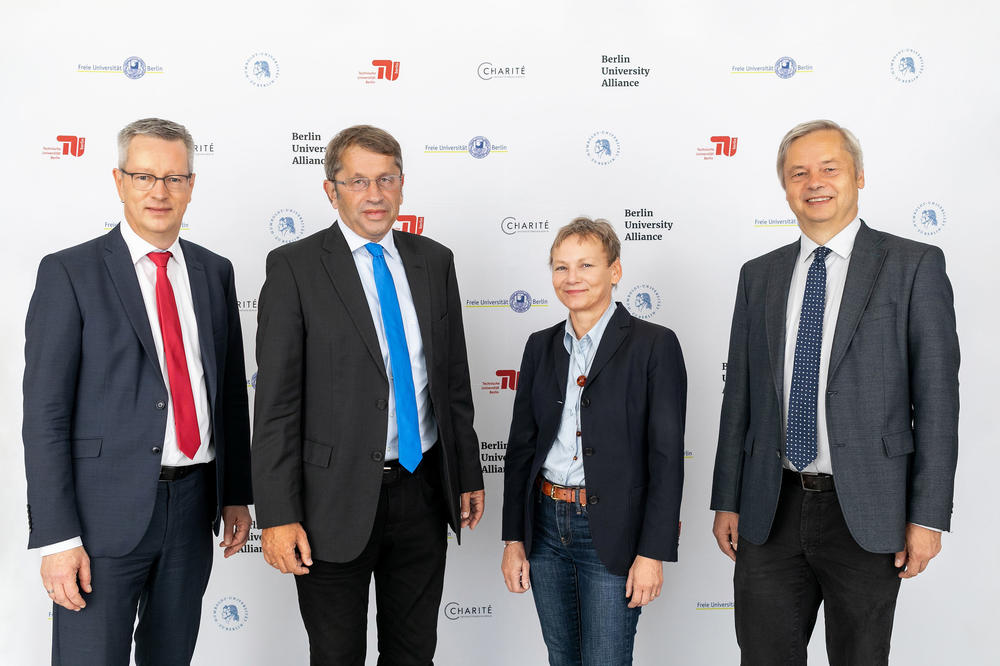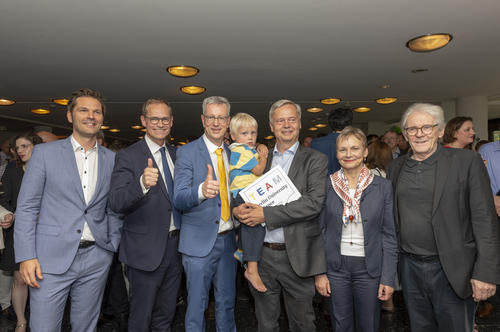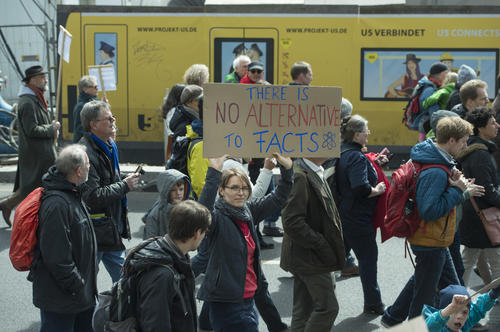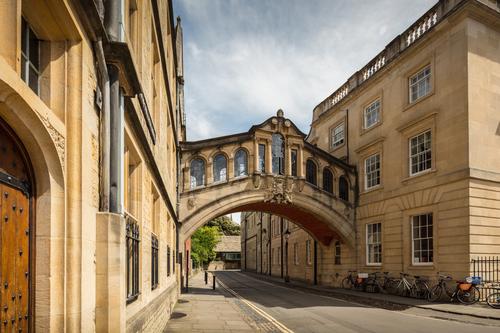“Now we have an opportunity to convince the skeptics that the joint proposal has paid off.”
Official launch: As of November 1, the Berlin University Alliance is being funded as a university consortium of Excellence. In an interview the heads of the institutions involved speak about what’s next.
Nov 01, 2019
Leaders of the Berlin University Alliance: Günter M. Ziegler, President of Freie Universität, Heyo K. Kroemer, Chief Executive Officer of Charité, Sabine Kunst, President of Humboldt-Universität, Christian Thomsen, President of Technische Universität
Image Credit: Michael Fahrig
The proposal of the Berlin University Alliance was approved in July, and on November 1, funding through the Excellence Strategy of the federal and state governments in Germany is beginning. Furthermore, the institutions participating in the Alliance are receiving additional funds from the Berlin Senate. In this interview, Professor Sabine Kunst, the president of Humboldt-Universität zu Berlin, Professor Günter M. Ziegler, the president of Freie Universität Berlin and current spokesperson for the Berlin University Alliance, Professor Christian Thomsen, the president of Technische Universität Berlin, and Professor Heyo K. Kroemer, the Chief Executive Officer of Charité – Universitätsmedizin Berlin, discuss how the Alliance will now be further developed.
Four institutions as large as the three Berlin universities along with Charité are cooperating on an institutional level – this is a completely new project. What are you working on in particular at the moment?
Sabine Kunst: In the initial phase of the Alliance, we have to set up many new processes in order to implement our diverse projects across institutional boundaries. This takes time. I am confident that we are on the right track here. As the Berlin University Alliance, we launched calls for proposals for joint research projects with our international partners in Oxford, Singapore, and Melbourne even before the funding period began. Our first Grand Challenge Initiative on “Social Cohesion” started with a pre-call, so with the start of funding through the Excellence Strategy we can now really get started.
Heyo K. Kroemer: Undoubtedly, this new way of working together presents us with challenges despite all the opportunities. But that is exactly what we are interested in: genuine cooperation that is more than just a loose alliance of interests. We are creating and implementing new forms of collaboration together.
What experience can you take from the proposal phase and apply to everyday life within the Alliance?
Günter M. Ziegler: We have learned that it is helpful to reconcile the very different experiences, strategic goals, and interests of the different parties. In the end, it is not institutions that work together, but people: therefore, it is essential that people know each other well, trust each other, and support each other – the familiarization phases and induction processes were extremely important and valuable here.
Christian Thomsen: During the proposal phase, it was of course clear to all of us that there was a submission date. Our timetable was geared to the submission of our joint proposal. Everything was leading up to this. Now, with our success in the competition, we have gained much room for maneuver. This should be cleverly planned and filled out. That is what we are working on right now. Of course, that is easier said than done.
United in joy: State Secretary Steffen Krach, Governing Mayor of Berlin Michael Müller, Günter M. Ziegler (Freie Universität), Christian Thomsen (Technische Universität), Sabine Kunst (Humboldt-Universität), and Karl Max Einhäupl (Charité).
Image Credit: Bernd Wannenmacher
Due to the high volume of proposals throughout Germany, all the winners of the Excellence Strategy have to make do with less money. The reduction is around 17 percent. How does this affect the Berlin University Alliance?
Günter M. Ziegler: The cuts hurt a lot because the budgets for all the Alliance projects were already tightly calculated. It will not be easy, but we still want to implement all the measures in the proposal. That is a challenge: we are now doing this with smaller budgets and even greater frugality – but that means even more creativity.
The Berlin University Alliance also receives annual funding from the Berlin Senate in the amount of six million euros. What are these funds used for?
Günter M. Ziegler: The Senate funds are specifically earmarked for two objectives: four million euros per year are available to work on issues relating to key societal challenges, which we have set ourselves as “Grand Challenges.” As my colleague has just said, we have already kicked off with a pre-call on the subject of “Social Cohesion” and have had a great response. Soon we would also like to jointly pursue questions on “Global Health.” The cooperation will be organized and funded in interdisciplinary and cross-institutional “Einstein Research Units.”
A further two million euros per year will be invested in dual career couples, gender equality, and diversity. That is, in particular in offers for partners of newly appointed scholars and scientists and for measures to make the Berlin research hub even more attractive, family-friendly, and diverse.
Gender equality, equal opportunities, studying and teaching, and internationalization are topics that affect all of the Alliance partners. How can we work together in these areas?
Günter M. Ziegler: The partners are very different, and this also applies to the concepts and projects in all these areas: thus, you can learn a lot from each other, support each other, but also spur each other on to greater achievements, and that is what we do, too. Together we are stronger! The international partnerships and cooperative relationships of the three universities along with Charité span the whole world, and as a result, we are all parts of excellent networks and also have a global presence. Together we are perceived as a “global player,” making us a strong partner for the renowned University of Oxford, for example, with which we as the Berlin University Alliance entered into a strategic partnership back in 2018.
Christian Thomsen: Recruitment is another example of cooperation. This is how we want to jointly attract the best researchers to Berlin. Here we also rely on our perception as a “global player,” as Günter M. Ziegler describes it. Our Alliance will create numerous opportunities for international early-career researchers, with a special emphasis on attracting outstanding women in research. Together, we will also develop standards that we can use for equality-oriented appointment procedures or for further development as family-friendly universities. With these measures, we hope that Berlin will position itself nationally and internationally as a pioneer. That is our goal.
Is the Alliance planning to set up a new coordinating office?
Günter M. Ziegler: Certainly! In order to ensure that all the actors involved in our four partner institutions are moving in the same direction, it is important to have a small but agile and effective office. This office will be launched soon and will continue the successful work of the previous coordination groups that oversaw our Alliance in the competition.
You already mentioned it briefly: for the Grand Challenge Initiative “Social Cohesion,” there was a call for funding for networking and theme exploration. Why exactly was this topic chosen first?
Christian Thomsen: We chose this topic because it greatly influences our social interaction, and not only in Germany. The topic is very complex, meaning numerous academic fields can and must provide contributions, projects, and solutions, considering how important this topic is. We are now trying not only to promote project ideas, but also to encourage our researchers to outline larger projects.
With its first call as part of the Grand Challenge Initiative on the topic of “Social Cohesion,” the Berlin University Alliance is promoting networking among researchers on this topic.
Image Credit: pixabay/ohurtsov
Will there be other comparable inter-institutional calls for proposals?
Christian Thomsen: There will be another call on this topic in the spring, so more extensive projects can be funded. In the meantime, it is important that we encourage our researchers in the four institutions to establish (even more strongly than before) contacts beyond their own disciplinary borders, to network, and to think in unusual ways. That is why I would like to appeal to all of you: go beyond your faculty or academic department and break new ground with collaboration! With its calls, the Berlin University Alliance can provide a framework for this.
Heyo K. Kroemer: I can only confirm that. The opportunities for interdisciplinary research are great. “Global Health” was already mentioned as one of the future topics of our Grand Challenge Initiative. It is another good example of “true” interdisciplinary research. It will unequivocally not only be about medical aspects. On the contrary, the Berlin University Alliance allows us to address the question of health and a sustainable society much more broadly through the diversity of disciplines. Urbanization, migration, and climate change also play an important role in global health issues.
An important topic of the Berlin University Alliance is exchange with society. What projects is the Alliance planning in this field?
Sabine Kunst: Many global challenges – especially those that we want to address with the Grand Challenges initiatives – can only be successfully addressed through the interaction of science and scholarship with society, politics, and the economy. We understand knowledge exchange as reciprocal exchange between researchers and other social actors who are connected by the aspiration of communicating as equals.
Can you give an example of this type of project?
Sabine Kunst: We plan to implement long-term exchange formats, so-called research forums, in which researchers and actors from politics, culture, business, and civil society come together. Together, all the participants will then define a thematic field of Berlin’s cutting-edge research with interdisciplinary and transdisciplinary approaches. Furthermore, the Alliance will also become more active in the field of research communication. Different formats for interaction with the public are being planned, as well as offering more further education opportunities in research communication for our scholars and scientists. The first exhibition on the premises of Humboldt-Universität in the Humboldt Forum will focus on top-level research in Berlin, with the Clusters of Excellence in particular being represented here. Communicating research from the often seemingly closed-off academic world is an important concern in this area.
Science and research are currently struggling with a loss of confidence. More exchange is important here; another aspect is more clarification and transparency with regard to the quality of research and the development of standards. How will the Berlin University Alliance deal with this important field?
Heyo K. Kroemer: Especially in today’s world, reliable facts are of particular importance in order to create the conditions for a sustainable society. This is why we look at different dimensions of the issue of research quality. The quality of research depends on the framework conditions and evaluation systems in science and research. This involves questions like: How often should an experiment be repeated for it to be considered replicable? What incentives can be given to research groups to achieve high quality results and what counts as “a valuable result” in this context? How do we deal with “negative results”?
There is no alternative to facts: the Berlin University Alliance focuses on research quality in order to strengthen confidence in research.
Image Credit: Bernd Wannenmacher
The pooling of resources is also planned in other fields. What can the Alliance build on in this area?
Sabine Kunst: The Alliance partners have already gained some experience in creating added value and economic synergies through the joint use of research infrastructures. A central concern of the Alliance is to systematize these approaches. We are talking here about putting the core business of universities – research, teaching, continuing education, and knowledge transfer – on an improved basis by sharing existing resources. We want to create added value through sharing in order to increase our performance and attractiveness as research institutions for students, teachers, and researchers. Our plans do not only relate to creating conditions that simplify the joint procurement of research infrastructures, for example in the form of large-scale equipment. We want to improve access to and use of existing devices and services. If we act wisely in this area, we will also benefit immensely from cooperation as individual institutions.
Heyo K. Kroemer: Infrastructure is a prerequisite for good research, so bundling and sharing it brings many benefits. The potential for this is enormous in the Alliance and would offer considerable added value for the partners, but also for Berlin as a hub of science and research.
The University of Oxford – here with one of its landmarks, the Hertford Bridge – and the Berlin University Alliance decided to establish a strategic partnership in 2017.
Image Credit: Michael Beckwith / Pixabay
One of the first Berlin University Alliance projects was to collaborate with the University of Oxford. An agreement was concluded here as early as 2018. What did and does this partnership actually look like?
Heyo K. Kroemer: The University of Oxford is our first joint international partner, a categorically new form of cooperation that we are very excited about. Since the beginning, intensive cooperation has been growing on various levels. From personal visits on site and getting to know the respective structures, people, and goals, to joint research projects and the planning of an “Oxford House” in Berlin and a “Berlin House” in Oxford: in this partnership there are numerous possibilities for cooperation. We are proud of the now second call for proposals for joint research projects with Oxford, which, as in the first round, is endowed with 450,000 euros. In the first call, 29 partnership projects were approved with the objective of developing a joint field of research across institutional, geographical, and disciplinary boundaries; in the second call, a further 24 projects were approved.
What are you particularly looking forward to in your cooperation as Berlin University Alliance?
Sabine Kunst: It is a good feeling that the Alliance can now get started with implementing its plans. During the proposal phase, we spent more than two years working on plans and strategies on the drawing board. Now we have an opportunity to convince the skeptics that the joint proposal has paid off.
Günter M. Ziegler: I am particularly looking forward to entering into a dialog with urban society and discussing the research projects of the Berlin University Alliance.
Christian Thomsen: I look forward to a lively and honest exchange – between the the executive boards, between the faculties or academic departments of our institutions and – hopefully – also between our students. Of course, I am also looking forward to many “aha!” moments in this cooperation. I am hoping that the majority of them will be received favorably and will provide positive insights. However, some will also – and I am a realist – be paired with disappointment. But it is precisely these that will bring us forward, both in academic research and in bringing people together.
Heyo K. Kroemer: The Alliance offers us a very special opportunity – namely to make much better use of the potential of the Berlin region. I am looking forward to working with the Berlin University Alliance to create a new kind of research collaboration that will contribute to a sustainable society and hopefully serve as an example for building many more alliances of this kind.
The questions were asked by Nina Diezemann and Annika Middeldorf.





